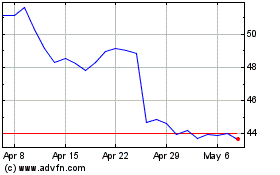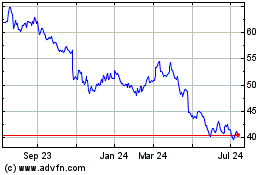Investors Look Past Rout in Tech Stocks -- WSJ
November 19 2018 - 3:02AM
Dow Jones News
By Akane Otani
This article is being republished as part of our daily
reproduction of WSJ.com articles that also appeared in the U.S.
print edition of The Wall Street Journal (November 19, 2018).
Many on Wall Street are weathering the autumn technology rout by
buying the shares of firms with slower, steadier earnings growth,
the latest sign that investors largely remain sanguine about U.S.
stocks despite recent reversals.
Trading has turned rocky since the S&P 500 finished the
third quarter with its biggest gain since 2013. The broad index is
down 6.1% since the end of September, while once-favored shares
like Netflix Inc. and Amazon.com Inc. have shed more than 20%
apiece.
Nine years into the U.S. stock rally, investors are grappling
with two forces. Many feel the best days of this economic cycle are
past, especially with windfalls from 2017's tax overhaul set to
fade. Though few economists foresee a recession soon, analysts and
portfolio managers say the fall pullback offers a reminder of the
ever-present risk that markets will fall sharply as rising interest
rates and slowing growth hit corporate profits.
But a hefty contingent contends there are still significant
gains to be had, thanks to the robustness of companies' bottom
lines. Third-quarter earnings at S&P 500 companies have surged
26% from the year-earlier period, according to FactSet, on track
for the largest gain since 2010.
While few traders and portfolio managers expect profit growth to
continue at anything approaching that clip, many say that buying
the shares of firms that are producing solid sales and earnings
growth will remain a winning strategy until profits actually begin
falling.
"You can't just buy willy-nilly anymore," said Michael Farr,
president of investment management firm Farr, Miller &
Washington in Washington, D.C. Rather than make bets on U.S. stocks
as a whole, Mr. Farr and his team have been scooping up shares of
companies whose potential to generate growth looks promising, like
Starbucks Corp. and Bristol-Myers Squibb Co., while trimming their
holdings of United Parcel Service Inc.
Starbucks delivered double the U.S. sales growth that analysts
had expected in the most recent quarter, while Bristol-Myers raised
its 2018 profit forecast after getting a boost from sales of drugs
like its cancer treatment Opdivo.
Mr. Farr isn't alone. In the third quarter, many hedge funds
retreated from shares of social-media firms that rallied sharply
over the past year, while picking up shares of businesses including
consumer staples firms, coffee chains and established software
developers.
Jana Partners LLC bought shares of packaged-food company Conagra
Brands Inc. while dumping all of its Facebook Inc. shares,
according to its most recent 13F filing. Activist investor Bill
Ackman disclosed a long position in Starbucks in October, while
Stanley Druckenmiller's Duquesne Family Office LLC dumped nearly a
quarter of its Amazon shares and picked up Microsoft Corp.
shares.
The jockeying reflects widespread expectations that economic
momentum will slow as factors like wage growth, rising interest
rates and a stronger dollar take more of a toll on profits,
analysts and investors say.
Earnings growth is expected to slow to 14% in the fourth quarter
before tapering off in the single-digit range in 2019. And although
more than three quarters of S&P 500 companies have posted
stronger-than-expected earnings, sales results have been less
impressive, with just 59% of firms beating analysts' estimates,
according to RBC Capital Markets.
That puts a premium on firms whose earnings are perceived to be
likely to hold up better as the economy slows. Oil giants Exxon
Mobil Corp. and Chevron Corp. each reported their best
third-quarter earnings in four years, thanks to a recovery in crude
prices earlier in 2018.
When Lori Calvasina, head of U.S. equity strategy at RBC Capital
Markets, traveled around the U.S. to meet with clients, she heard
the phrase "late cycle" in many of her conversations. It is a sign,
she said, many investors can't help but feel the end of the
economic expansion is drawing closer, even in the face of solid
economic data.
The firm lowered its year-end target for the S&P 500 to 2890
from 3000 in April and cut its rating for technology stocks to
"underweight."
There is a silver lining. The S&P 500 has historically
struggled in the short term after a peak in earnings growth. But
the stock market has managed to produce double-digit percentage
gains over the following three years when profit growth peaked and
then decelerated -- rather than outright contracting, according to
RBC Capital Markets.
"Equity markets are saying to companies that the easy money has
already been made," said Nicholas Colas, co-founder of DataTrek
Research. "In 2019, they'll have to work for it."
Write to Akane Otani at akane.otani@wsj.com
(END) Dow Jones Newswires
November 19, 2018 02:47 ET (07:47 GMT)
Copyright (c) 2018 Dow Jones & Company, Inc.
Bristol Myers Squibb (NYSE:BMY)
Historical Stock Chart
From Mar 2024 to Apr 2024

Bristol Myers Squibb (NYSE:BMY)
Historical Stock Chart
From Apr 2023 to Apr 2024
